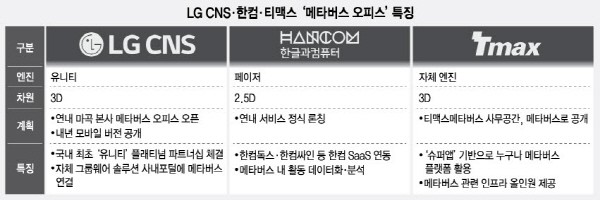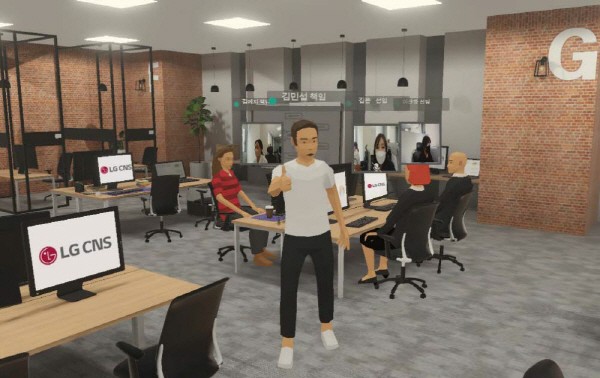LG CNS, plans to open this year with Unity
Hancom, to boost efficiency of working at home by integrating SaaS
Tmax, provides super app based all-in-one service

LG CNS, Hancom, and Tmax Metaverse revealed a Metaverse specialized for the office environment and expanded the daily workspace into the Metaverse.
This is the steppingstone to preoccupy the demand of Metaverse offices which provide an innovative work environment, maintain an offline work environment, and remove spatial limitations.
LG CNS is planning for the opening of their Seoul Magok-based Metaverse office within the year. They are currently connecting email, schedule management, and work system with the office made virtually with the Unity platform.
For this end, LG CNS became the first Korean company to sign a platinum partnership with Unity for business cooperation for the Metaverse.

LG CNS’ Metaverse office connects their own in-house groupware solution portal with the Metaverse platform. It applies various functions, including 1 on 1 video chatting, multilateral video meetings, and video conferences that can host over 1,000 people. After applying the Metaverse office to their company and verifying the technology, LG CNS plans to expand their business to external clients.
A spokesman for LG CNS said, “Through continuous updates on the Metaverse office in content and reflection of reviews, we plan to push for a mobile version of the Metaverse office next year.”
Hancom is launching a 2.5D-based ‘physically linked office Metaverse service’ within this year. It will provide an on/offline linked office through the Metaverse. They plan to add cooperative tools to the Metaverse technology possessed by Hancom, such as video meetings/chatting, and improve the efficiency of working at home by connecting and establishing offline services, like attendance recognition, conference room reservations, and parking.
Hancom’s policy will be to turn all activity within the Metaverse office into data through the physically linked office Metaverse service, and to analyze this to improve functionality and expand the service to improve work efficiency.
Byeong-ki Kim, head of strategic planning at Hancom, said that, “We plan to apply cloud-based SaaS services like Hancom Docs and Hancom Sign to the Metaverse and create a smart workplace,” and went on to say, “Compared to a 3D-based service, the 2.5D service maximizes the efficiency of cooperation through office technology, allowing it to quickly respond to the needs of the market, and has expandability by connecting with various services.”

Tmax Metaverse is targeting the demand for the establishment of Metaverse-based office environments and is set to release a no-code platform where anyone can easily build the Metaverse they want.
Tmax Metaverse is based on various solutions offered by Tmax affiliates like Tmax Office, Tmax Cloud, Tmax Tibero, and Tmax WAPL, and supports a Metaverse-based virtual office service.
In addition to a 3D Metaverse space, it provides cooperation tools needed in the virtual office space, such as video meeting, messenger, document sharing, and schedule/ calendar tools, with their own solutions. They are preparing to provide their own Metaverse server service.
Tmax is conducting pre-sales through their B2B sales organization, and are planning to use Tmax Metaverse’s office space as a metaversation testbed by the end of the year.
A spokesman for Tmax Metaverse, said that, “Tmax Metaverse provides almost all Metaverse related services and infrastructure as an all-in-one service,” and revealed that, “We will eliminate blind spots in IT by allowing various companies to utilize the Metaverse based on super apps.”
Professor Sang-kyun Kim of Kyung Hee University said that, “Like the office Metaverse, the vertical (specialized product line) Metaverse is positioned as an axis,” and went on to say, “In order to secure space to work together, platforms must work on low-spec devices, and it should be easy to connect the HR and approval system.”
Reporter Hye-mi Kwon (hyeming@etnews.com)